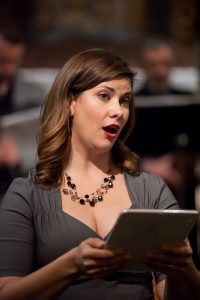Evanston RoundTable, March 22, 2018
“We’re the new kid on the block,” says Evanston resident Angela Young Smucker, one of the founders of Third Coast Baroque, “so we’ve come up with some fresh angles to reframe the music.”

Fresh is good, because the Chicago area is awash with Baroque and early music ensembles, including Music of the Baroque, the Newberry Consort, the Haymarket Opera Company, Callipygian Players, and Schola Antiqua of Chicago. Each has a different spin on music of that era, generally considered to include works composed between 1600 and 1750 and exemplified at its peak by the towering music of Monteverdi, Bach, and Handel.
Baroque’s popularity derives from its effervescent, ornate, and often brilliant style and a trend toward more historically informed performances that strive for greater authenticity and take into account the instruments, bows, and playing techniques of the era.
Third Coast Baroque’s approach reflects the unique perspective of the group’s Artistic Director, Rubén Dubrovsky. Mr. Dubrovsky is from Argentina but studied in Germany and is based in Vienna, where he leads his own group, the Bach Consort Wien.
Ms. Young Smucker, who is a highly regarded mezzo-soprano studying for her doctorate in vocal performance at Northwestern University, had worked with Mr. Dubrovsky previously. “I admired his engaging and collaborative approach and unique presentation style,” she said. “Rubén takes the repertoire and uncovers why it’s still relevant for today’s audiences.”
So she and a colleague, Nathalie Colas, approached Mr. Dubrovsky in 2016 about starting the group.
Their first performance was Nov. 6, 2016, in Chicago’s Columbus Park. A benefit at Piccolo Theatre in Evanston was held the next night. Since then they’ve performed in Evanston and Chicago in April and November 2017, varying vocal and instrumental programs. Their next concert here is 7:30 p.m. April 7 at Galvin Hall at Northwestern. The all-Vivaldi program will feature renowned mezzo-soprano Vivica Genaux.
Mr. Dubrovsky’s mother taught piano and his father played Argentine folk music. He grew up playing folk guitar and cello. Many years later, he said, “I realized our native folk music sounded like Baroque music—the dances and rhythms.” And the folk music, he further realized, had its origins in African rhythms and songs that slaves brought over to the New World. He frequently talks about Baroque’s varied roots in the engaging presentations he makes during his concerts.
He will also discuss Baroque’s relevance to today’s music. “Kids think classical music is for rich white people and has nothing to do with them. Not so,” he says emphatically. “The folk roots of Baroque reflect native dance music,” which he says can be heard in black, African American, and Latino music and even contemporary pop, rap, and R&B. “Baroque,” adds Ms. Young Smucker, “is a building block.”
This kind of audience discussion is critical, Mr. Dubrovsky says. “It is very important to provide context, to make it easier for people to understand and connect. It’s not just nice music; I’m trying to provide insight into an aspect of our universal culture.”
“Call it Baroque musicology made painless,” wrote the Tribune music critic John von Rhein after the group’s April 2017 concert. “Also informative. Also entertaining. If this is how Dubrovsky hopes to reframe early music, break down barriers, and cultivate an ongoing dialogue with listeners, then bring it on, I say.”
“Rubén is wildly enthusiastic about the music and works at a very high artistic level,” says Evanston resident Jerry Fuller, who plays double bass with and sits on the advisory board of Third Coast Baroque. Mr. Fuller also leads his own Baroque ensemble, Ars Antigua Presents. “[Rubén] has been very successful bringing his cross-cultural vision to audiences. He knows how to bring it all together.”

+ There are no comments
Add yours